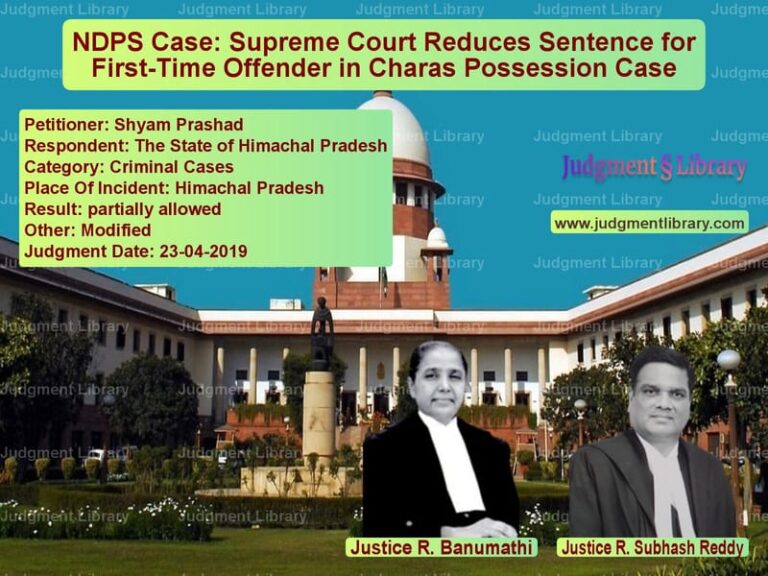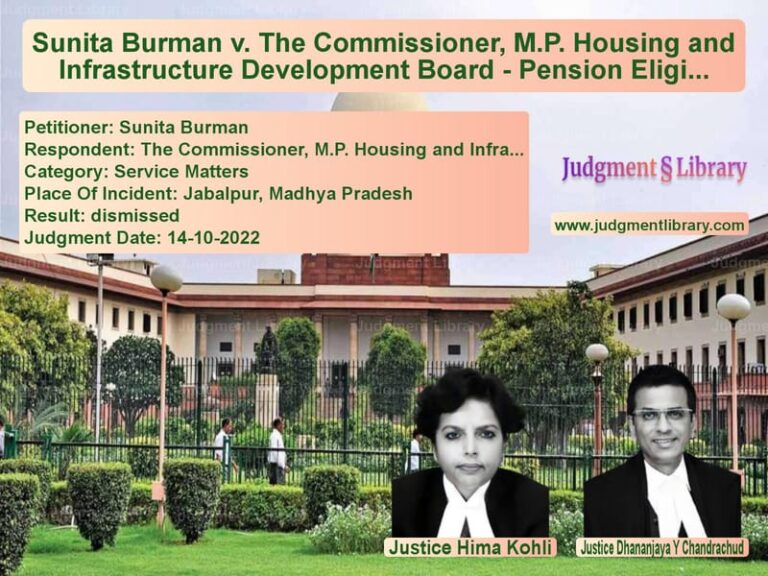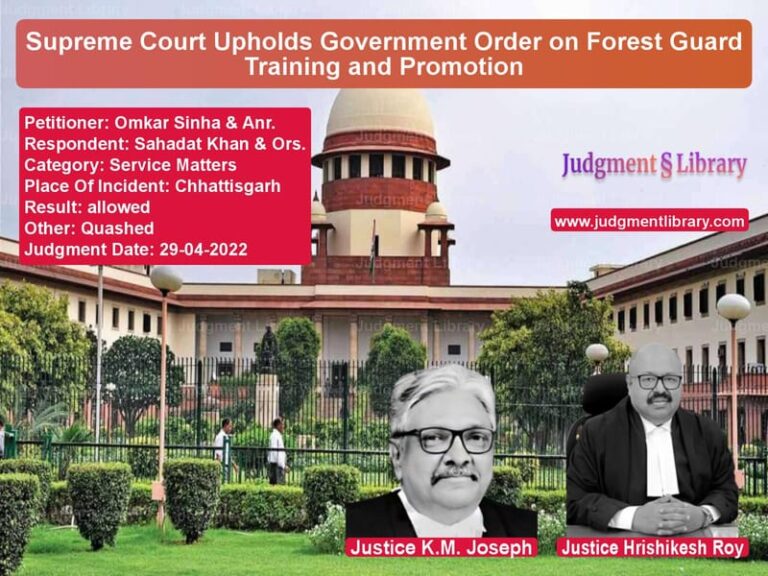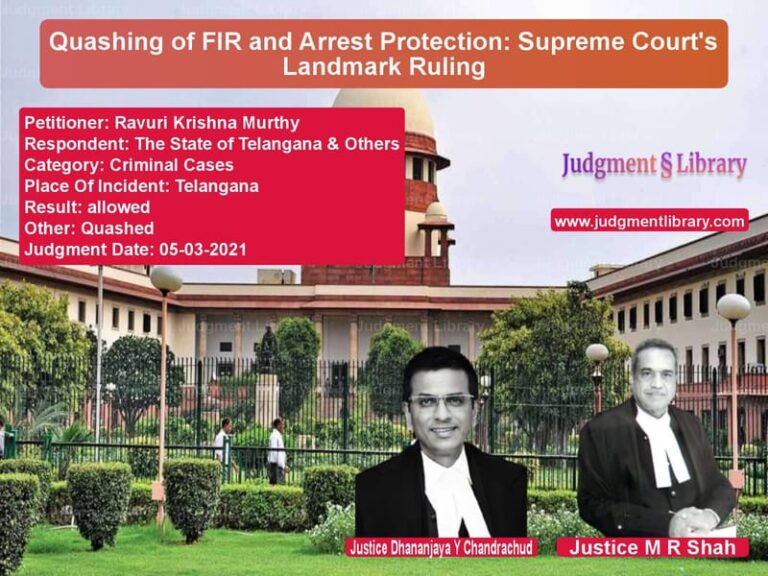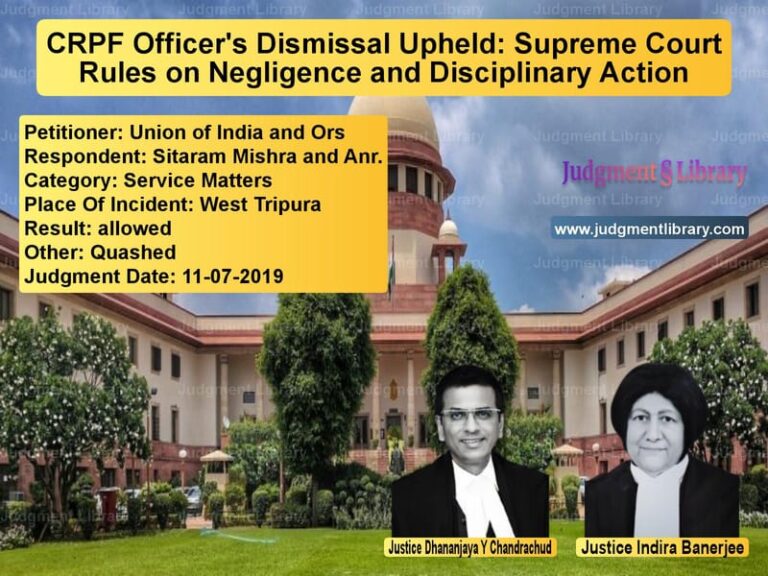Undue Influence in Property Transactions: Supreme Court’s Verdict on Fraud Allegations
The Supreme Court of India recently adjudicated on a significant case concerning allegations of undue influence in property transactions. The case involved a dispute over a sale deed executed in 1970, which the appellant, Raja Ram, challenged on the grounds of fraud and coercion. The respondents, Jai Prakash Singh and others, defended the sale deed as a legitimate transaction, free from any undue influence.
Background of the Case
The dispute centered around a property sale deed executed on March 2, 1970, by the appellant’s father, Vaijai, in favor of the respondents. The appellant alleged that the sale deed was obtained fraudulently by the respondents through undue influence, exploiting the old age and infirmity of the deceased. He claimed that his father, who was over 80 years old at the time, was mentally impaired and incapable of making such a transaction.
The trial court dismissed the appellant’s suit, ruling in favor of the respondents. However, the first appellate court reversed this decision, finding that the respondents had failed to prove that the sale was executed without coercion. The High Court, in a second appeal, reinstated the trial court’s verdict, leading the appellant to challenge the decision before the Supreme Court.
Arguments of the Appellant
The appellant’s counsel contended:
- The deceased was old, bedridden, and mentally impaired at the time of executing the sale deed.
- The respondents, who were in a fiduciary relationship with the deceased, exerted undue influence over him.
- The consideration for the sale was not fully paid, and the respondents failed to produce evidence of payment.
- The deceased had no history of selling property to outsiders, indicating that he would not have voluntarily sold the disputed land.
- The sub-registrar who recorded the sale deed was not examined, raising doubts about the transaction’s validity.
Arguments of the Respondents
The respondents countered with the following points:
- The burden of proof lay on the appellant to establish undue influence, which he failed to do.
- The deceased was mentally sound at the time of the transaction and had executed a similar sale deed in 1968 without challenge.
- The sale deed was registered, and the deceased personally appeared before the sub-registrar to acknowledge the transaction.
- The wife of the deceased, who was present at the registration, did not object to the sale.
- The appellate court erroneously shifted the burden of proof onto the respondents instead of requiring the appellant to substantiate his claims.
Supreme Court’s Analysis
The Supreme Court meticulously examined the claims and evidence presented by both parties. The key observations were:
- Undue influence under Section 16 of the Indian Contract Act requires evidence that one party was in a position to dominate the will of the other.
- The mere fact that the deceased was old and living with the respondents did not automatically establish undue influence.
- The appellant provided no medical evidence to prove that his father was mentally impaired at the time of the transaction.
- The registration of the sale deed in the presence of the sub-registrar, without any objections from the deceased, suggested a voluntary transaction.
- The appellant’s failure to challenge another sale deed executed by the deceased in 1968 weakened his argument that the deceased was incapable of making such decisions.
Final Judgment
The Supreme Court ruled in favor of the respondents, affirming the High Court’s decision. The judgment stated:
“The primary ingredients of the law need to be first established by proper pleading supported by relevant evidence. Cases cannot be decided on assumptions or presumptions.”
The Court emphasized that the burden of proving undue influence rested on the appellant, which he failed to discharge. Consequently, the appeal was dismissed.
Implications of the Judgment
This ruling reinforces the principle that claims of undue influence and fraud must be supported by substantive evidence. Key takeaways include:
- Mere old age or physical infirmity does not imply a lack of mental capacity to execute legal documents.
- Registered sale deeds carry a presumption of validity unless proven otherwise.
- Courts require concrete proof rather than assumptions to declare a transaction void.
The judgment upholds the sanctity of contractual transactions and protects bona fide purchasers from baseless challenges.
Petitioner Name: Raja Ram.Respondent Name: Jai Prakash Singh & Others.Judgment By: Justice Navin Sinha, Justice Indira Banerjee.Place Of Incident: Uttar Pradesh.Judgment Date: 11-09-2019.
Don’t miss out on the full details! Download the complete judgment in PDF format below and gain valuable insights instantly!
Download Judgment: Raja Ram vs Jai Prakash Singh & Supreme Court of India Judgment Dated 11-09-2019.pdf
Direct Downlaod Judgment: Direct downlaod this Judgment
See all petitions in Property Disputes
See all petitions in Succession and Wills
See all petitions in Judgment by Navin Sinha
See all petitions in Judgment by Indira Banerjee
See all petitions in dismissed
See all petitions in supreme court of India judgments September 2019
See all petitions in 2019 judgments
See all posts in Civil Cases Category
See all allowed petitions in Civil Cases Category
See all Dismissed petitions in Civil Cases Category
See all partially allowed petitions in Civil Cases Category


